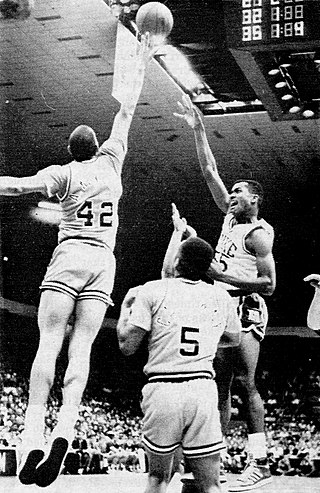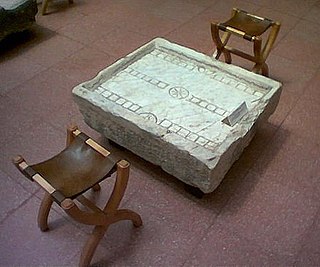Related Research Articles

Native American gaming comprises casinos, bingo halls, and other gambling operations on Indian reservations or other tribal lands in the United States. Because these areas have tribal sovereignty, states have limited ability to forbid gambling there, as codified by the Indian Gaming Regulatory Act of 1988. As of 2011, there were 460 gambling operations run by 240 tribes, with a total annual revenue of $27 billion.


Foxwoods Resort Casino is a hotel and casino complex owned and operated by the Mashantucket Pequot Tribal Nation on their reservation located in Ledyard, Connecticut. Including six casinos, the resort covers an area of 9,000,000 sq ft (840,000 m2). The casinos have more than 250 gaming tables for blackjack, craps, roulette, and poker, and have more than 5,500 slot machines. The casinos also have several restaurants, among them a Hard Rock Cafe. It has been developed since changes in state and federal laws in the late 20th century enabled Native American gaming on the sovereign reservations of federally recognized tribes.

Ontario Lottery and Gaming Corporation, known for corporate branding purposes simply as OLG since 2006, is a Crown corporation owned by the Government of Ontario, Canada. It is responsible for the province's lotteries, charity and Aboriginal casinos, commercial casinos, and slot machines at horse-racing tracks. It was created in April 2000 when the Ontario Lottery Corporation (OLC) was merged with the Ontario Casino Corporation (OCC), established in 1994. Prior to 2006, the combined entity was known in short form as the OLGC. OLG employs over 8,000 individuals throughout Ontario; 1,400 in Sault Ste Marie and the GTA offices. There are approximately 9,800 retailers operating more than 10,000 lottery terminals across the province.
partypoker is an online poker card room. Launched in 2001 by PartyGaming, the site has had up to 80,000 players logged-in and was the largest online card room until 2006. In 2011 PartyGaming merged with bwin to form Bwin.Party Digital Entertainment. As of 2017, it remains among the largest online poker card rooms. The site was endorsed by Mike Sexton, the former host of the World Poker Tour television show. The domain partypoker.com attracted at least 3.6 million visitors annually by 2008 according to a Compete.com study. In 2016, after a protracted bidding process between 888 Holdings and GVC Holdings, Bwin.Party Digital Entertainment accepted GVC Holdings' bid for £1.1 billion. Today, the site is run by GVC Holdings and is available in 14 different languages. In addition to partypoker.com, partypoker also offers dedicated networks for French and Italian based players via partypoker.fr and partypoker.it, respectively. GVC Holdings also acquired Partycasino during the 2011 merger of Party Gaming.
Gambling in the United Kingdom is regulated by the Gambling Commission on behalf of the government's Department for Digital, Culture, Media and Sport (DCMS) under the Gambling Act 2005. This Act of Parliament significantly updated the UK's gambling laws, including the introduction of a new structure of protections for children and vulnerable adults, as well as bringing the burgeoning Internet gaming sector within British regulation for the first time.

888 Holdings plc, formerly Virtual Holdings Limited, is an international sports betting and gambling company. It owns brands such as 888casino, 888poker, 888sport, Mr Green, and William Hill. Business operations are conducted from its headquarters in Gibraltar, alongside satellite offices in Bucharest, Ceuta, Leeds, London, Malta, Sofia, and Tel Aviv. It is listed on the London Stock Exchange and is a constituent of the FTSE 250 Index.

Billy Matthew King is an American basketball executive. He is the former general manager of the Brooklyn Nets and Philadelphia 76ers NBA teams, as well as former team president of the 76ers.

The British Columbia Lottery Corporation is a Canadian Crown corporation offering a range of gambling products including lottery tickets, casinos and legal online gambling. It is based in Kamloops, with a secondary office in Vancouver. It consists of three business units, Lottery, Casino and eGaming; and five support divisions, Human Resources, Information Technology, Compliance & Security, Finance, and Communications. Its annual revenues exceed CDN $3.1 billion. It has 890 direct employees. Its service providers, who run casinos on its behalf under contract, have an additional 8,300 employees.
Richard Arthur Hayward, also known as Skip Hayward, was the tribal chairman of the Mashantucket Pequot Tribe from 1975 until November 1, 1998. He was replaced by Kenneth M. Reels. Before becoming the tribal chairman, he worked as a pipefitter at General Dynamics Electric Boat and lived in Stonington, Connecticut. In 1994, the University of Connecticut awarded him an honorary degree.
The Missouri Gaming Commission regulates riverboat casinos, charitable bingo, and fantasy sports contests in Missouri. It is headquartered in Jefferson City.
Foxwoods Casino Philadelphia was a proposed casino to be located first along the Delaware River, then under pressure from local residents attempted to move to The Gallery at Market East in Center City in Philadelphia, Pennsylvania. It was one of five stand-alone casinos awarded a gaming license on December 20, 2006, by the Pennsylvania Gaming Control Board. The Board revoked the license in December 2010.
California v. Cabazon Band of Mission Indians, 480 U.S. 202 (1987), was a United States Supreme Court case involving the development of Native American gaming. The Supreme Court's decision effectively overturned the existing laws restricting gaming/gambling on U.S. Indian reservations.

The Connecticut Indian Land Claims Settlement was an Indian Land Claims Settlement passed by the United States Congress in 1983. The settlement act ended a lawsuit by the Mashantucket Pequot Tribe to recover 800 acres of their 1666 reservation in Ledyard, Connecticut. The state sold this property in 1855 without gaining ratification by the Senate. In a federal land claims suit, the Mashantucket Pequot charged that the sale was in violation of the Nonintercourse Act that regulates commerce between Native Americans and non-Indians.

Gambling in Italy has existed for centuries and has taken on many forms. Its dates back to the days of the Roman Empire, when the predecessor of the modern game of backgammon, Ludus Duodecim Scriptorum, became popular among Roman legionnaires. It is also due to them that the game came to other European countries.
Legal forms of gambling in the U.S. state of North Carolina include the North Carolina Education Lottery, three Indian casinos, charitable bingo and raffles, and low-stakes "beach bingo". North Carolina has long resisted expansion of gambling, owing to its conservative Bible Belt culture.
iGaming Business, sometimes stylized as iGB, is a business-to-business (B2B) magazine focusing on the online gambling industry. It launched in 2003, and has two sister magazines - iGaming Business North America and iGB Affiliate.

Gary M. Green is a musician, author, television host, gaming consultant and entrepreneur.
Legal forms of gambling in the U.S. state of Connecticut include two Indian casinos, parimutuel wagering, charitable gaming, the Connecticut Lottery, and sports betting.
Felix D. Rappaport was an American businessman in the casino industry. He was a casino executive in Las Vegas, Nevada, for two decades.
References
- ↑ "Casino Hires Ex-Regulator". New York Times . January 6, 1993. Retrieved 2007-06-21.
G. Michael Brown, a former New Jersey gaming regulator who became a lawyer for the gaming industry, was named today as chief executive officer of the fast-growing Foxwoods High Stakes Bingo & Casino.